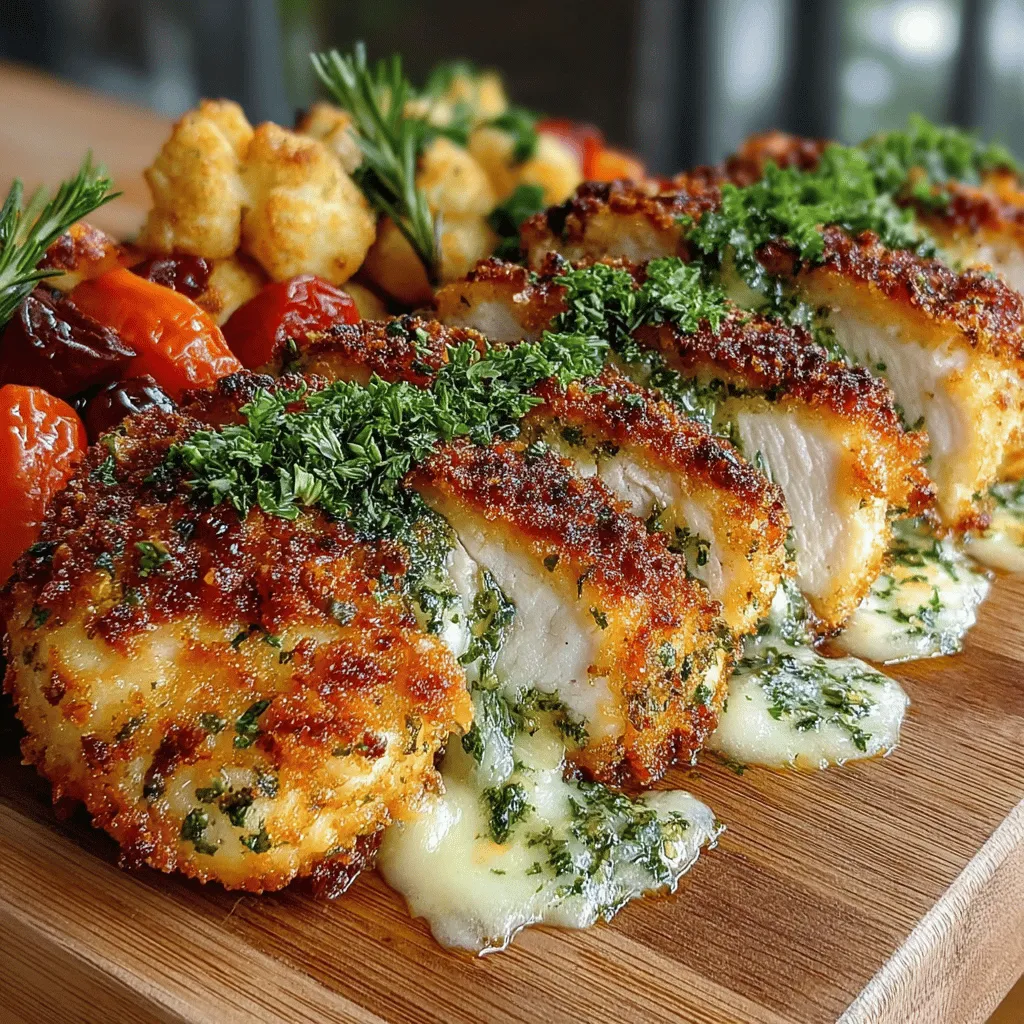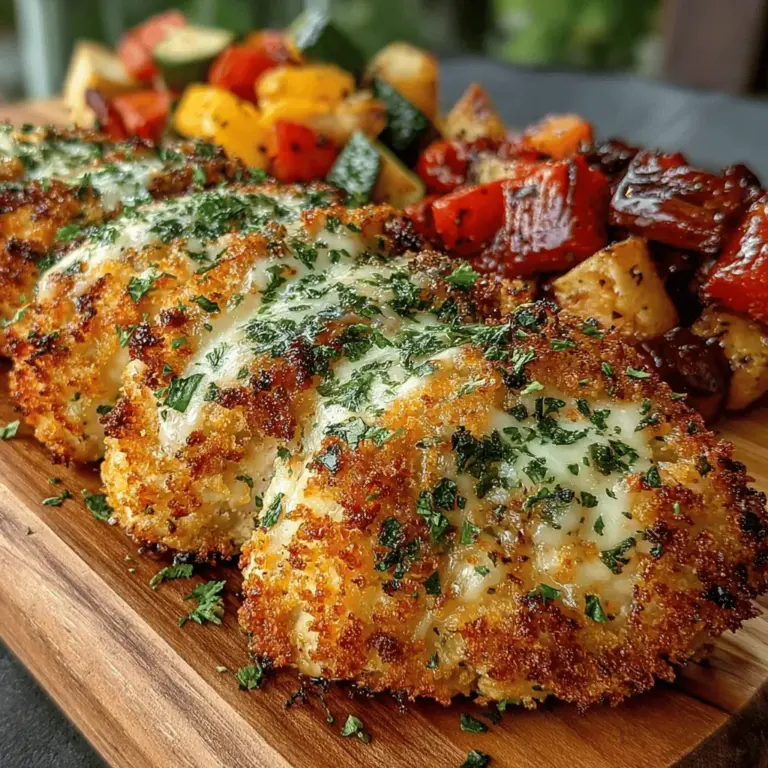Introduction to Parmesan Herb Crusted Chicken Breast
In the realm of home cooking, few dishes manage to strike the perfect balance between simplicity and sophistication quite like Parmesan Herb Crusted Chicken Breast. This recipe captures the essence of Italian cuisine, marrying the creamy, nutty flavors of freshly grated Parmesan cheese with a medley of aromatic herbs. The result is a dish that not only pleases the palate but also impresses visually, making it an ideal centerpiece for both casual family dinners and more elaborate gatherings.
The allure of Parmesan Herb Crusted Chicken lies in its versatility. It can easily transition from a hearty weeknight meal to a standout dish for special occasions. The crunchy, golden-brown exterior provides a delightful contrast to the juicy, tender chicken inside, ensuring that each bite is both satisfying and flavorful. As you prepare this dish, you’ll find that its straightforward approach allows even novice cooks to achieve impressive results, making it a staple in many households.
Understanding the Ingredients
To fully appreciate the beauty of Parmesan Herb Crusted Chicken Breast, it’s essential to understand the key ingredients that contribute to its deliciousness. Each component plays a vital role in creating the perfect harmony of flavors and textures that define this dish.
The Stars of the Dish: Chicken Breasts
At the heart of this recipe are boneless, skinless chicken breasts, which serve as the canvas for the flavors to come. When selecting chicken breasts, opting for high-quality, fresh poultry is crucial. Look for organic or free-range options whenever possible, as these tend to have a more robust flavor and a better texture. The quality of the chicken will not only elevate the dish but also ensure that it remains juicy and tender throughout the cooking process.
The beauty of chicken breasts lies in their adaptability; they readily absorb flavors and can be paired with a variety of seasonings. This makes them an excellent choice for a dish that relies on a flavorful crust to elevate the overall meal.
The Flavor Foundation: Parmesan Cheese and Herbs
Parmesan cheese is undeniably the star flavoring agent in this recipe. While pre-grated Parmesan can be convenient, using fresh, finely grated Parmesan cheese yields the best results. Fresh cheese boasts a richer flavor and a creamier texture that enhances the overall experience. Additionally, fresh Parmesan melts beautifully, forming a delightful crust when baked.
Complementing the cheese are various dried Italian herbs such as oregano, basil, and thyme. These herbs infuse the chicken with a fragrant, savory aroma that embodies the essence of Italian cooking. The combination of these herbs not only enhances the flavor profile but also adds a layer of complexity that makes each bite enjoyable. For those adventurous in the kitchen, consider experimenting with combinations of fresh and dried herbs to create a unique taste that suits your preferences.
The Crunch Factor: Breadcrumbs
A key component of the crust is the breadcrumbs. When it comes to breadcrumbs, there are different options available, but Panko breadcrumbs are often preferred for this recipe. Panko, which are coarser and lighter than traditional breadcrumbs, yield an extra crispy texture that elevates the dish. Their airy quality allows them to fry up beautifully, creating a satisfying crunch that contrasts with the tender chicken.
Regular breadcrumbs can certainly be used if Panko is unavailable; however, the texture may not be as light and crispy. Regardless of your choice, the breadcrumbs are essential for providing that irresistible crunch that makes Parmesan Herb Crusted Chicken so appealing.
The Binding Agents: Eggs and Milk
To achieve that perfect, cohesive coating on the chicken breasts, eggs and milk act as binding agents. The egg wash, a mixture of beaten eggs and a splash of milk, plays a critical role in ensuring that the breadcrumbs adhere properly to the chicken. When the chicken is coated in this mixture before being dredged in breadcrumbs, it creates a seal that locks in moisture during baking, resulting in a succulent dish.
The egg wash not only helps the breadcrumbs stick but also contributes to the overall color and appearance of the crust. A well-executed egg wash will yield a beautifully golden-brown crust that is visually appealing and delicious.
Seasoning Essentials: Garlic, Onion Powder, Salt, and Pepper
Finally, no dish is complete without seasoning. For this recipe, garlic powder, onion powder, salt, and pepper are essential for enhancing the flavor depth of the chicken. Garlic powder adds a savory punch, while onion powder provides a subtle sweetness that balances the dish. Salt and pepper are crucial for bringing all the flavors together and ensuring that the chicken is well-seasoned.
For those looking to customize their seasoning profile, consider adding a pinch of smoked paprika for a touch of warmth or some crushed red pepper flakes for a hint of heat. The beauty of this recipe lies in its flexibility; feel free to experiment with your favorite spices to create a flavor profile that resonates with your taste.
Step-by-Step Guide to Preparation
Now that we’ve explored the essential ingredients that make up Parmesan Herb Crusted Chicken Breast, it’s time to dive into the preparation process. A well-organized kitchen can make all the difference when it comes to cooking, so let’s set the stage for success.
Setting the Stage: Prepping Your Kitchen
Before you begin, it’s essential to prepare your kitchen for the cooking process. An organized space not only makes cooking more enjoyable but also allows for a smoother workflow. Start by gathering all your ingredients and tools. You will need:
– A cutting board and a sharp knife for preparing the chicken.
– Three shallow bowls for the breading station.
– A baking sheet lined with parchment paper for easy cleanup.
– A whisk for beating the eggs and milk.
– Tongs or a fork for handling the chicken.
Once your workspace is set up, preheat your oven to 400°F (200°C) to ensure it’s ready for the chicken once it’s coated.
Creating a Breading Station
To achieve the perfect crust on your chicken, you’ll want to create a designated breading station using the three-bowl method. This process allows for a systematic approach to coating the chicken, ensuring that every piece is evenly coated.
1. Bowl One: In the first bowl, combine the eggs and milk. Whisk them together until well blended, creating a smooth mixture that will act as the adhesive for the breadcrumbs.
2. Bowl Two: In the second bowl, mix together the breadcrumbs, grated Parmesan cheese, and your choice of dried Italian herbs. This will form the flavorful crust that will envelop the chicken.
3. Bowl Three: The third bowl can be reserved for any additional seasonings you may want to add, such as garlic powder, onion powder, salt, and pepper. This ensures that your seasoning is evenly distributed throughout the crust.
With your breading station set up, you’re ready to begin coating your chicken breasts. The process is straightforward: dip each chicken breast into the egg wash, allowing any excess to drip off, then transfer it to the breadcrumb mixture. Press gently to ensure an even coating, then place the coated chicken on the prepared baking sheet. Repeat this process until all the chicken breasts are coated, taking care to maintain a clean workspace.
As you embark on this culinary journey, the anticipation of the delicious flavors and textures that await you will surely fuel your passion for cooking. Stay tuned for the next part of this article, where we will discuss the baking process and tips for serving your Parmesan Herb Crusted Chicken Breast to perfection.

Preparing the Chicken: Seasoning and Coating
To achieve the perfect Parmesan Herb Crusted Chicken Breast, proper preparation is key. This begins with ensuring the chicken breasts are dry and well-seasoned, which enhances flavor and texture.
Techniques for Drying and Seasoning Chicken Breasts
Start by patting your chicken breasts dry with paper towels. This step is crucial because moisture can prevent the coating from adhering properly and can result in a soggy texture. Once dried, season the chicken breasts generously with salt and pepper. This initial seasoning penetrates the meat and starts building a flavorful base. For an extra flavor boost, consider adding garlic powder or onion powder to the mix.
Step-by-Step Instructions for Dredging, Dipping, and Coating
Now that your chicken is seasoned, it’s time to coat it. Follow these steps for a flawless crust:
1. Prepare your breading station: You will need three shallow dishes. In the first dish, combine flour with a pinch of salt and pepper. The second dish should contain beaten eggs, and in the third, mix panko breadcrumbs with grated Parmesan cheese, dried herbs (like oregano, thyme, and basil), and a bit of garlic powder.
2. Dredge the chicken: Take one seasoned chicken breast and dip it into the flour, ensuring it’s coated evenly. Shake off any excess flour.
3. Dip in the egg: Next, transfer the floured chicken into the beaten eggs, allowing it to soak slightly for better adhesion. Make sure it’s fully coated.
4. Coat with breadcrumbs: Finally, place the chicken in the breadcrumb mixture, pressing down gently to ensure the crumbs stick well. Repeat this process for each chicken breast.
5. Rest the coated chicken: Allow the coated chicken breasts to rest for about 10 minutes. This helps the coating adhere better during cooking.
Baking the Chicken to Perfection
Once your chicken is coated, it’s time to bake it to achieve that golden, crispy crust while keeping the meat juicy.
Preheating the Oven: The Right Temperature Matters
Preheating your oven to 400°F (200°C) is essential. This step ensures that the chicken begins cooking immediately when placed in the oven, resulting in a crispier crust. A properly preheated oven also helps to cook the chicken evenly. While the oven heats, line a baking sheet with parchment paper or lightly grease it to prevent sticking.
Baking Techniques for Optimal Crispiness
With the oven preheated, it’s time to bake your chicken:
1. Arrange the chicken: Place the breaded chicken breasts on the prepared baking sheet, ensuring they are spaced apart. Overcrowding can lead to steaming rather than crisping.
2. Bake for the right amount of time: Bake the chicken for about 20-25 minutes, flipping halfway through. This helps both sides become evenly golden and crispy.
3. Monitor internal temperature: Use a meat thermometer to check for doneness. The internal temperature should reach 165°F (75°C) for safe consumption.
4. Broil for extra crispiness (optional): If you want an extra crunchy finish, turn on the broiler during the last 2-3 minutes of baking. Keep a close eye on it to prevent burning.
Serving Suggestions and Pairings
Once your Parmesan Herb Crusted Chicken is out of the oven, it’s time to think about serving. This dish pairs wonderfully with a variety of sides.
Ideal Side Dishes for Parmesan Herb Crusted Chicken
Here are some side dish ideas to complement your chicken:
– Fresh Salads: A simple arugula salad with lemon vinaigrette provides a refreshing contrast to the richness of the chicken. You could also try a classic Caesar salad for a more indulgent pairing.
– Roasted Vegetables: Roasted asparagus, Brussels sprouts, or carrots seasoned with olive oil, salt, and pepper are excellent choices. Their natural sweetness balances the savory flavors of the chicken.
– Grains: Serve with a side of quinoa, couscous, or a light pasta dish tossed in olive oil and herbs for a complete meal.
Presentation Tips for a Stunning Plate
Presentation is key to making your dish visually appealing. Here are some tips:
– Plate Smartly: Use a large white plate to allow the vibrant colors of the chicken and sides to stand out.
– Garnish: Fresh herbs like parsley or basil can add a pop of color and freshness. A sprinkle of lemon zest or a wedge on the side can brighten the dish.
– Layering: Place a bed of greens or grains on the plate, then arrange the chicken on top. This creates height and interest.
Nutritional Benefits of the Dish
Understanding the nutritional value of your meal can enhance your dining experience, especially when you’re cooking for health.
A Balanced Meal: Proteins and Nutrients
Chicken breast is a fantastic source of lean protein, which is essential for muscle repair and overall health. It is low in fat, especially when the skin is removed, making it a great choice for those watching their calorie intake.
The herbs and vegetables you serve alongside not only add flavor but also increase the dish’s nutrient density. For instance, herbs like parsley are rich in vitamins A, C, and K, while vegetables offer fiber and essential minerals.
Dietary Considerations
If you’re catering to specific dietary needs, there are easy adaptations you can make:
– Gluten-Free: Substitute traditional breadcrumbs with gluten-free breadcrumbs or crushed gluten-free crackers.
– Low-Carb: For a low-carb option, consider using almond flour instead of regular flour and skip the breadcrumbs entirely. You can also serve the chicken over a bed of sautéed spinach or zucchini noodles.
– Healthier Alternatives: Swap out traditional Parmesan cheese for a lower-fat cheese option or nutritional yeast for a dairy-free version without sacrificing flavor.
Conclusion: Why Parmesan Herb Crusted Chicken Breast is a Must-Try
In conclusion, Parmesan Herb Crusted Chicken Breast is more than just a meal; it’s an experience that brings together flavors, textures, and nutrition. Its ease of preparation makes it accessible for cooks of all skill levels, while its impressive presentation makes it a standout dish for any occasion. Whether enjoyed on a busy weeknight or served at a gathering, this recipe embodies the joy of home-cooked meals. With each bite, you’ll discover the harmonious blend of crispy crust and tender chicken, reminding you why this dish has earned a cherished place in kitchens around the world.
Try this recipe today, and savor the delightful combination of savory herbs and crispy Parmesan that will surely become a family favorite.

